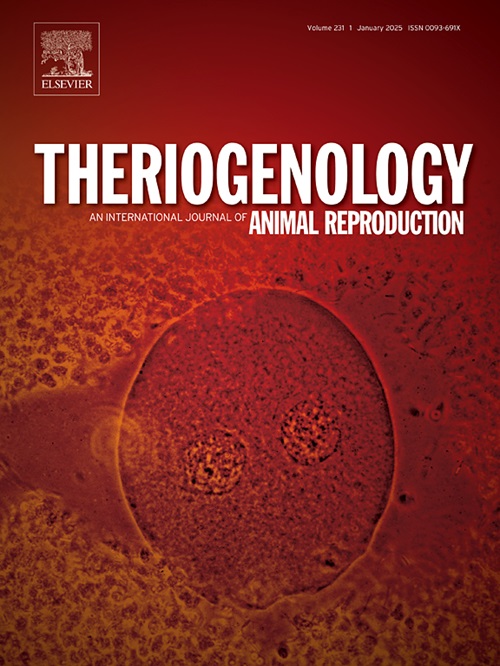Supplementation with N-Acetyl-L-cysteine during in vitro maturation improves goat oocyte developmental competence by regulating oxidative stress
IF 2.4
2区 农林科学
Q3 REPRODUCTIVE BIOLOGY
引用次数: 0
Abstract
Oocyte quality can affect mammal fertilization rate, early embryonic development, pregnancy maintenance, and fetal development. Oxidative stress induced by reactive oxygen species (ROS) is one of the most important causes of poor oocyte maturation in vitro. To reduce the degree of cellular damage caused by ROS, supplementation with the antioxidant N-Acetyl-L-cysteine (NAC) serves as an effective pathway to alleviate glutathione (GSH) depletion during oxidative stress. This study investigated the effects of NAC supplementation during in vitro maturation of goat oocytes and explored the molecular mechanisms of maturation by transcriptome sequencing of MⅡ oocytes. The results showed that 1.5 mM NAC significantly increased the rates of oocyte maturation and cumulus cell expansion and improved the subsequent development of embryos. During the subsequent culture of parthenogenetically activated embryos, 1.5 mM NAC significantly increased the division rate of oocytes and blastocyst rate. It also reduced the accumulation of ROS, increased the level of GSH, alleviated oxidative stress, and enhanced the antioxidant capacity and cell metabolic activity. Transcriptome sequencing results revealed that NAC treatment significantly increased the expression of SIRT1, GGCT, and MITF genes related to the cellular antioxidant system, as well as the IDH3G gene related to energy metabolism, and decreased the expression of CASP8, FOS, and MMP1 genes related to apoptosis and cell invasion, as well as the CCL2. and CXCL8 genes related to the inflammatory response. In conclusion, the findings suggest that NAC supplementation significantly reduces oxidative stress, improves antioxidant capacity and metabolic activity, promotes oocyte maturation, and improves oocyte quality.
求助全文
约1分钟内获得全文
求助全文
来源期刊

Theriogenology
农林科学-生殖生物学
CiteScore
5.50
自引率
14.30%
发文量
387
审稿时长
72 days
期刊介绍:
Theriogenology provides an international forum for researchers, clinicians, and industry professionals in animal reproductive biology. This acclaimed journal publishes articles on a wide range of topics in reproductive and developmental biology, of domestic mammal, avian, and aquatic species as well as wild species which are the object of veterinary care in research or conservation programs.
 求助内容:
求助内容: 应助结果提醒方式:
应助结果提醒方式:


